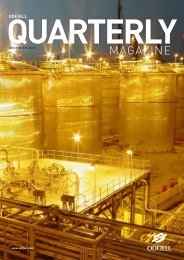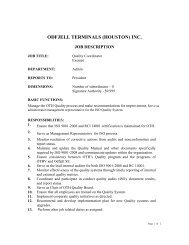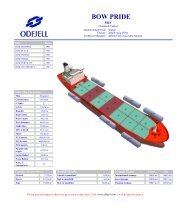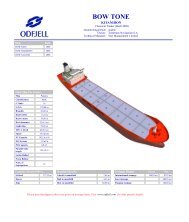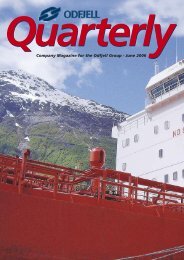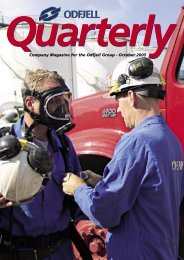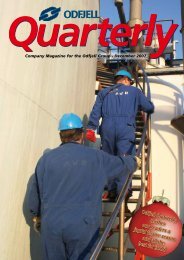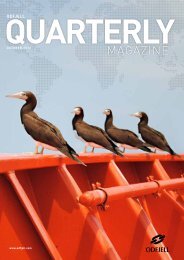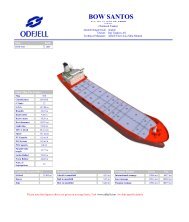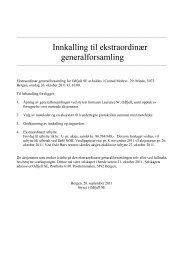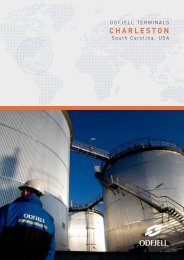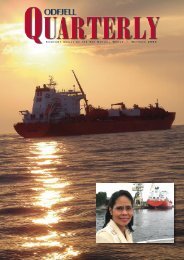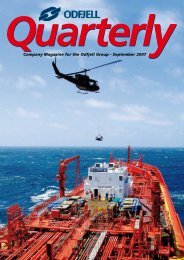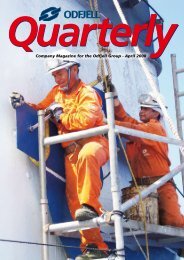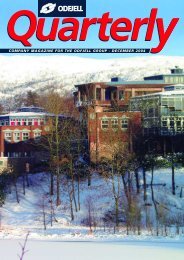Odfjell SE Annual Report 2012
Odfjell SE Annual Report 2012
Odfjell SE Annual Report 2012
You also want an ePaper? Increase the reach of your titles
YUMPU automatically turns print PDFs into web optimized ePapers that Google loves.
and Jannicke Nilsson. The Audit Committee has consisted<br />
of Terje Storeng (chair) and Irene Waage Basili and the<br />
Nomination Committee has since the same date consisted<br />
of Arne Selvik (chair), Christine Rødsæther and Laurence<br />
Ward <strong>Odfjell</strong>.<br />
CORPORATE SOCIAL RESPONSIBILITY<br />
<strong>Odfjell</strong> signed up for the UN Global Compact programme<br />
in 2011. The corporate policy was amended accordingly,<br />
and we established an internal working group to ensure<br />
compliance and to facilitate a gradual implementation<br />
of the United Nations' ten principles within the areas of<br />
Human Rights, Labour, Environment and Anti-Corruption.<br />
The first annual report outlining the Company’s efforts to<br />
implement the ten principles was submitted in March <strong>2012</strong>.<br />
QUALITY HEALTH, SAFETY AND ENVIRONMENT (QH<strong>SE</strong>)<br />
Also in <strong>2012</strong> we have continued our strong focus on the<br />
environment through, amongst other, seeking improved<br />
fuel efficiency and thereby reduced emissions. We track<br />
our progress by means of the Carbon Disclosure Project<br />
(CDP), where our particular scope in <strong>2012</strong> was shipping,<br />
the Bergen office and the terminals in Rotterdam and<br />
Houston. The Energy Efficiency Operational Indicator<br />
(EEOI), defined as the amount of CO 2<br />
emitted per unit of<br />
transport work, for the <strong>Odfjell</strong> fleet was 17.48 grams of CO 2<br />
per tonne cargo transported one nautical mile (g/tnm) in<br />
<strong>2012</strong>. This is a slight improvement compared to 2011. In<br />
<strong>2012</strong> <strong>Odfjell</strong> operated about half of the fleet in slow speed<br />
mode. This generated a net fuel saving of about 90,000,<br />
tonnes, corresponding to emission savings of approximately<br />
280,000 tonnes of CO 2<br />
, and 4,400,000 tonnes of SO X<br />
. Use of<br />
advanced weather routing contributed to emission savings<br />
of about 5,000 tonnes CO 2<br />
. Further, in <strong>2012</strong> <strong>Odfjell</strong> started<br />
to carry out hull cleaning and propeller polishing between<br />
scheduled dry-dockings. This, together with installation of<br />
propeller ducts, is expected to give significant fuel reductions<br />
and subsequent lower CO 2<br />
, NO X<br />
and SO X<br />
emissions.<br />
Incidents and compliance issues at our Rotterdam terminal<br />
have pointed to potential weaknesses in part of our governance<br />
model and have served as strong reminders of the<br />
importance of fit for purpose personnel, processes and<br />
assets. <strong>Odfjell</strong> has therefore further increased our focus on<br />
risk awareness, process safety, use of preventive barriers<br />
and enhancement of our safety culture as part of a proactive<br />
QH<strong>SE</strong> drive ranging from the Board down to the front-line<br />
operative units. In terms of personal safety indicators,<br />
our shipping-related Lost-Time Injury Frequency (LTIF)<br />
indicator improved marginally from 1.23 in 2011 to 1.21 in<br />
<strong>2012</strong>. <strong>Odfjell</strong> Terminals’ LTIF improved more significantly<br />
from 2.90 to 1.30, which is very positive. We had no incidents<br />
involving fatalities in <strong>2012</strong>.<br />
Piracy continues to be a concern for shipping. Attacks in the<br />
Gulf of Aden and the Indian Ocean have abated significantly<br />
in <strong>2012</strong>, with no successful hijackings since May. Suspicious<br />
approaches, however, are frequently being reported, so<br />
we still use privately contracted security personnel in<br />
the high risk areas. On the other hand, violent attacks on<br />
ships in Western Africa have increased substantially, thus<br />
posing a new threat to ships and their crews. Boarding<br />
robberies of ships in the Malaccan Strait area is also again<br />
a growing concern.<br />
<strong>Odfjell</strong> Corporate QH<strong>SE</strong> conducts system audits on operative<br />
and staff units to ensure compliance with corporate and<br />
management level requirements and expectations, in order<br />
to promote a robust QH<strong>SE</strong> culture and thereby to continually<br />
lift our operating standards and to ensure compliance with<br />
the ever-increasing and changing regulatory demands on<br />
our complex activities. 12 audits were carried out in <strong>2012</strong><br />
while 21 are planned for next year.<br />
<strong>Odfjell</strong> has recycled seven ships in <strong>2012</strong>. To ensure a<br />
controlled process we have a programme in place that<br />
includes obtaining Green Passports for ships that are ready<br />
to be phased out. The programme meets the requirements<br />
of IMO Resolutions A 962 and 179 as certified by Lloyds.<br />
A Green Passport requires mapping of materials and<br />
potential hazards on board that can impact the environment<br />
and working conditions. It also requires follow-up by the<br />
recycling yard. We inspect the yards used to ensure that<br />
they are ISO 30000 certified and comply with respective<br />
IMO guidelines and our own particular requirements as<br />
to QH<strong>SE</strong> standards.<br />
The Rotterdam terminal has been a major challenge to<br />
<strong>Odfjell</strong> in <strong>2012</strong>. Following several incidents and observations<br />
from Dutch authorities, <strong>Odfjell</strong> Management decided to<br />
temporarily effectuate a safety shutdown of the terminal<br />
in July <strong>2012</strong>. Investigations were initiated to uncover the<br />
root cause of the events that led up to the safety shutdown.<br />
Findings were addressed, corrective and preventive measures<br />
put in place and compliance verified by <strong>Odfjell</strong> and the<br />
authorities, and during the last quarter tanks have gradually<br />
been put back into service. As of end <strong>2012</strong>, about 700,000<br />
cbm were up and running, and the distillation units were<br />
operating at limited capacity. Key issues to sustainable<br />
safe performance as we re-commission the terminal<br />
have been the rigorous and systematic implementation<br />
of preventive maintenance using a state of the art platform.<br />
The terminal has also adopted a state of the art Risk Based<br />
Inspection system to validate mechanical integrity of tanks<br />
and furthermore is using a system for Reliability Based<br />
Mechanical Integrity on other systems.<br />
CORPORATE GOVERNANCE<br />
The framework for the Company’s Corporate Governance is<br />
the Norwegian Code of Practice for Corporate Governance<br />
of 23 October <strong>2012</strong>. <strong>Odfjell</strong> is committed to ethical business<br />
practices, honesty, fair dealing and full compliance with<br />
all laws affecting our business. This includes adherence<br />
to high standards of Corporate Governance. See also the<br />
Board’s statement regarding corporate governance, which<br />
is part of the Group’s annual report. <strong>Odfjell</strong>’s Corporate<br />
Social Responsibility Policy also encompasses high focus on<br />
11<br />
odfjell annual report <strong>2012</strong>



